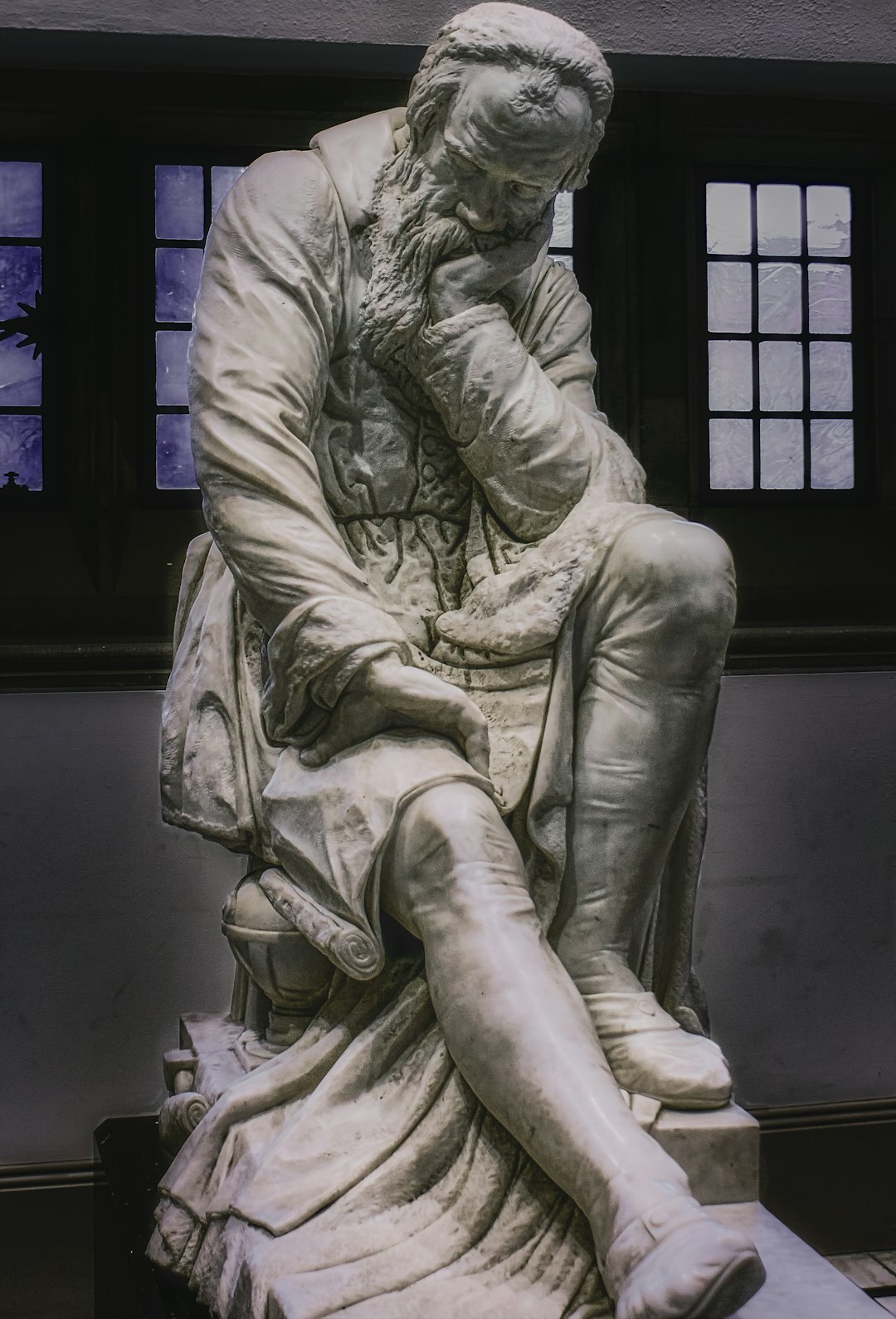The Souls of the People
Free time; free mind.
What would you do with such a radical freedom from a major source of anxiety, feeling of inadequacy, or pressure, as that of a nihilistic view of your financial future?
Some will undoubtedly party while others decide to simply lounge-around, maybe catch up on a deficiency of rest. That’s certainly understandable. Others will immediately begin building companies, and inventing new products and designs. Producing solutions that the market deems worthy of parting with their income over. But those are the extremes of the bell-curve distribution. Roughly 90-95% of the population will be somewhere in between these two extremes. What does this entail?
For the rest of us, that means a more comfortable medium where we are empowered by the pull between our freedoms and our passions. Human beings are intrinsically creative. We will feel the pang to create works of art, or creative engineering solutions. Like an itch that can’t be scratched without work. We do not do boredom well. We are naturally driven to improve our environment in any multitude of forms or fashions that trip that particular trigger for each of us.
I wrote an article a short while back that was a bit more esoteric and emotional, but I think it effectively details this particular argument quite well. Each passion that an individual in society takes has the potential to be a service to another participant in that society. A pianist can provide a beautiful melody to a restaurant or bar (a personal favorite of mine), or a painter can produce a mural, or an engineer can invent a solution for a business owner, or a personal trainer can lend wisdom and instruction. Everyone brings a value to the table, whether they realize it or not. This is how social organization enables and inspires innovation.
Freedom; Valued In Its Absence
This is why freedom is so valuable to a society. Freedom to let the heart & mind wander and explore new territories, new approaches, new solutions. This is a freedom that can be further afforded when money is actually separated from the state. We have performed clever attempts at separating the two over a few millennia, buuuut all roads consistently converge at consolidation and centralization of powers and authority. Which then results in abuses of these powers, and ultimately the reaction to such abuses — a ripping-apart of the system and an attempt at rebuilding a better system to take its place.
I’ve heard the French have fancied utilizing guillotines for this process in the past.
By separating monetary powers from the state, we have the opportunity to remove one of those drivers of consolidation & centralization of powers. Resulting in a loosening of the chains that bind a populace. Where it is not an immediate gratification to be felt by the average individual, per say, but more of a mitigation of damages in the future. Ultimately meaning: not reaching a future that exposes the value of such a system serves as an advert of its very success. A type of insurance on the human condition.
This is a concept that the majority of the populace struggles to grasp and is precisely why hard times are created by weak men. Weak men chase immediate gratification, and argue against responsible preparation and discipline. Dictated by their fleeting whims and desires for comforts & luxuries rather than seeking resilience.
Whereas the good times, the eras delivered by strong men, are achieved by delaying the immediate satisfaction of enjoying these comforts in exchange for a more secure future. Strong men do work today that makes the work for next month, and next year easier. Strong men offset pleasures & comforts in order to solve problems, for himself and his neighbor(s).
What the whimsical do not understand is this: offsetting gratification and solving tomorrow’s problems today is a mitigation of costs in the future. An insurance on the ‘morrow. By solving tomorrow’s problems today, we allow ourselves a cushion of time & space, both in the real and in the mind, to be able to solve new problems as they arise.
Separating money from the hands of the state is a tomorrow problem that has been pushed-off to the following day for decades in the United States of America. In doing so we have produced the environment today where the average individual is wedged between the pressure of the Fiat Hamster Wheel (FHW) and their addictions to their whims. These people do not realize that they have had their minds & bodies hijacked; their humanity used against them. Sedating them, keeping them docile and dumb.
We have an opportunity here to prove that we are not those weak men.
We have an opportunity to show that we are strong men willing to do what is necessary, and at the cost of today, in order to yield a better future for tomorrow. For more than just our own selfish gain.

This is where the snowball starts…
Since we are in the midst of the internet age, I am going to just assume that we have all heard of Moore’s Law. But what does not get routinely discussed is the angle that I have hit on leading up to this point: while technology has improved the efficiency and capability for our species to do work, very little conversation gets dedicated to the consideration that such technology also allows for efficiency and capability of cognition, emotion, spirituality, and creativity. Because technology enables work to be done, it frees up our minds to dedicate time and effort towards solving other problems. This is where we finally arrive at the basis for this series. This is where the snowball starts…
How many of you remember The Renaissance? Sure you might remember what it signified, or what it represented, but how about the timeline? Do you remember how long it took? What it was built upon?
Such societal transitions don’t just immaculately conceive. Societies grow and evolve, no differently than a caterpillar growing into a butterfly or a child maturing into adulthood. The difference is that these evolutions are much larger, therefore requiring much more time, for a number of reasons.
For hundreds of years the radical ways of thought slowly spread throughout the individuals of society, saturating hearts & minds like water slowly sniffing out every nook and cranny.
The first renaissance took place in the 1400s and 1500s, while the foundations for monumental shifts in thought, science, culture, and art that would come to represent The Renaissance were established in the 1200s and 1300s.
Why? How could this be? How could this take so long?
Communication. It’s all about the speed, depth, and breadth of the communication protocols available at the time. The printing press wasn’t brought onto the scene until the 1400s, which acted as a flash point that led to an ignition of the combustible concoction of political, cultural, spiritual, and scientific circumstances in and around Italy. Prior to the printing press, all communications were handwritten. Meaning messages and exchanges took prolonged amounts of time to be received. Slowing down the process of comprehension. Revelations and epiphanies took long stretches of time to execute and evolve because the messages took time to deliver, as well as the time to contemplate and comprehend. This also meant that trade and the exchange of money took substantial amounts of time.
What this also means is that capital flight and reorganization were limited in their speed of execution. Speed of communication protocols act as both a limiting and an enabling factor of their impact.


What also played a large role in the speed of spread was the baseline intellect and education of the populace. An idea cannot spread rapidly if it is difficult to conceptualize by those it is being spread to.
No different than a virus; if it’s slow to infect; it’s slow to spread.
*This is why ELI5 is such a powerful meme.
History’s Lesson In Today’s Flavor
Contrast the environment then, with that of today. Speed of communication and economic exchange is nearly instantaneous. Breadth of reach for communications is virtually total. Education of the average individual is radically higher than it was 600 years ago. However, vast swaths of the populations of developed nations are at a loss for time – and by relation a loss of mental/spiritual/emotional capacity, due to the FHW. The average American is compressed in nearly every facet of life.
An economically compressed population is where creativity and passion go to die. Original thought and critical-thinking require a mixture of creativity as well as passion. In order to (1) approach a problem from multiple angles and viewpoints, and (2) for the desire to find a solution to the problems we are faced with. When creativity and passion die the soul withers. We have seen just that in the most recent decades. Technological innovation has stagnated. The major players just rip each other off, resulting in a plateauing of quality and diversity of products & services that are available to the market.
One thing that is experiencing innovation is money. And the whole of the world is reluctant to even look at it. This nascent form of money allows for such radical gains in efficiency with regards to value storage, transfer, and exchange that it can provide the basis for clearing economies of mountains of waste by cutting out middlemen that are no longer necessary. While in the very same breath also providing a mechanism that incentivizes extremely cheap energy generation and grid balancing. With this asset and network also being beyond the manipulation and fabrication of any single individual, organization, or nation. Once this asset reaches effective market saturation I believe it can potentially provide a much more useful measuring stick for economic activity.
What good is a measurement like GDP when 40% of the supply was printed within a 24 month period?
Hint: it’s not.
Such radical developments will fundamentally alter the behavior of individual market participants. Where once individuals were incentivized to spend-spend-spend, they will be more incentivized towards frugality. Where once individuals could see no way to steer clear of a nihilistic future, they now have an avenue for planning towards a potentially fruitful future, even if it is only a marginal improvement, with a much simpler execution strategy. Which is what the average individual needs; simplicity. Where individuals are not required to become fund managers and day traders in order to protect their accumulated wealth from the guise of inflation.
Incentivizing low time preference in a population makes for an environment where health returns, where hearts & minds heal, and where inspiration is allowed to blossom. In this environment the nuclear family is incentivized and thrives. Which allows for effective and proper parenting of offspring, and where immaturity in the adult population is punished rather than rewarded.
These shifts in the societal environment will also occur parallel to the reshuffling of wealth distribution. This will mean that value will accumulate to new groups and individuals with new perspectives and new ways of doing things. Meaning that funding of new ideas and new solutions for new problems (and old ones) will be allowed to develop where recursive and wasteful avoidance of what’s new has been holding society back.
The catch? This all takes time.
Stick around for Part III
Like, Share, and Subscribe!








HODL Renaissance B.0